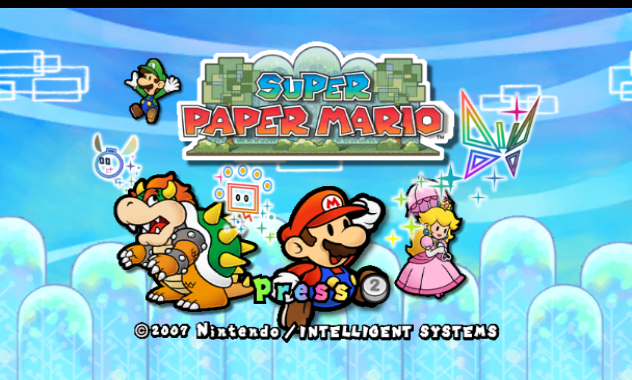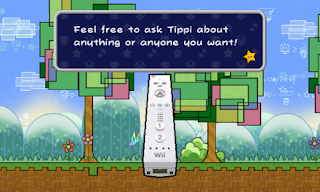
Once upon a time, there was a man who worked at Nintendo. His job was to play the Mario games produced by people other than Nintendo EAD and ensure that the games fit in with the Mario IP. This man played an innocuous little game called "Super Paper Mario" and gave it the Nintendo Seal of Approval.
What the hell was he thinking?
In all seriousness, Super Paper Mario is a game unlike any other in Mario's vast, vast collection, and in many ways, the line between the classic Paper Mario trilogy and the modern one is drawn here. I don't think fans of Super Paper Mario fully realise just how not-Mario this game is. And let me just say, 2007 was quite the time for this game to come out, in the context of not only the Mario RPGs, but in terms of what Nintendo EAD was up to...
But for now, to really sell exactly what it is we're looking at, we have to talk about how this game was marketed. Rather than being a turn-based combat system like 64 and TTYD, SPM shares a lot more in common with New Super Mario Bros. (at the time, the only new entry into the 2D Mario sphere in years). As a result, a number of commercials, including one I saw very young that I tragically couldn't track down, liked to advertise this game as another entry in the critically acclaimed Mario series, using a major ability introduced early in Chapter 1 as if it was a Miyamoto-esque signature gimmick. Trust me, if you're coming into this game expecting anything even remotely similar to the actual platformers, you are inadequately prepared for the sheer waves vaguely you are about to witness. I suspect this may have ultimately been something the hurt the project on multiple levels.

But let's actually delve in to what exactly we're looking at here.
From the wish-granting heavens and a fabled treasure comes... a book of prophecies. So far so good.
And right away, we can see that unusual tone make its impact. We interrupt your regularly scheduled Mario wahoos to bring you a morality tale on the nature of seeking to know your own destiny.
This isn't even going to be the actual substance of the story, by the way. This is just the backstory of a key item.
It knows the outcome of all the world's history. All of it. What country do you live in? What regime do you live under? This book can tell you how and when it dies. Not if. When. If you're the ruler of that regime, it's probably going to involve your death. Are you looking forward to that? Want to overthrow the old world and establish a new one? Yup, it'll tell you how the new one dies too.
Fortunately, it looks thin enough that if you're not a major factor in human history, your death will be just a footnote. ...Whether that's actually something you take comfort in may differ from person to person.
This seems like a good idea. I mean, whenever it's being owned by somebody reading it, it clearly ends in disaster.
("Prognosticus" is not a real world. It appears to be an extension of the word "prognosis"- which is the doctor's explanation for what they think your disease is going to do to you if left unchecked- with a Latin ending to make it sound like a book. Honestly, the word alone is funny enough to inspire the giggle it wants you to have.)
The mention of the book's "last owner" is interesting, because I think we're supposed to interpret the story as being about someone who owned the book after the sealing previously detailed, but the way this passage is written, it sounds like the book will be sealed after the events of the game and we're seeing the explanation why. I'm going to assume that, either way, the book will get sealed away and for good reason.
Yes, this story is, in fact, a tale of love. Somehow.
Oh great, now we're reading it. No wonder the game caused so much division.


















































